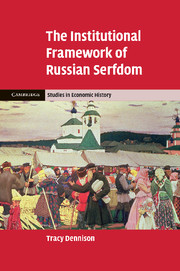Book contents
- Frontmatter
- Contents
- List of figures and tables
- Preface
- A note on the value of the rouble
- A note on transliteration
- List of abbreviations
- Glossary
- Map: Yaroslavl' and surrounding provinces
- 1 Why is Russia different? Culture, geography, institutions
- 2 Voshchazhnikovo: a microcosm of nineteenth-century Russia
- 3 Household structure and family economy
- 4 The rural commune
- 5 Land and property markets
- 6 Labour markets
- 7 Credit and savings
- 8 Retail markets and consumption
- 9 The institutional framework of Russian serfdom
- Bibliography
- Index
- References
9 - The institutional framework of Russian serfdom
Published online by Cambridge University Press: 03 May 2011
- Frontmatter
- Contents
- List of figures and tables
- Preface
- A note on the value of the rouble
- A note on transliteration
- List of abbreviations
- Glossary
- Map: Yaroslavl' and surrounding provinces
- 1 Why is Russia different? Culture, geography, institutions
- 2 Voshchazhnikovo: a microcosm of nineteenth-century Russia
- 3 Household structure and family economy
- 4 The rural commune
- 5 Land and property markets
- 6 Labour markets
- 7 Credit and savings
- 8 Retail markets and consumption
- 9 The institutional framework of Russian serfdom
- Bibliography
- Index
- References
Summary
This book began with the question of how to explain why Russia was (and perhaps is) so different from ‘the west’. Three different approaches to this question were discussed, of which one, the cultural approach, has attracted by far the greatest following over the century and a half or so since this question began to occupy the minds of Russian, and eventually western, intellectuals. In subsequent chapters the preponderance of the evidence reviewed has favoured the institutional over the cultural approach. However, when one thinks of the institutional structure of rural Russia in this period, the first thing that comes to mind is something called ‘serfdom’. Yet serfdom has played a seemingly peripheral role in the discussion of peasant society in these pages. What exactly was its relevance – if any – to the local economy we have been discussing?
Russian serfdom
It hardly needs to be repeated, after everything that has been said, that the rural society depicted in this study comes across as a much more open, dynamic society than that usually portrayed in the literature on Russian peasants. The rural inhabitants of Yaroslavl' province do not appear to have been ‘subsistence-oriented’, as the Peasant Myth maintains, or reluctant to engage in market transactions. Serfs at Voshchazhnikovo engaged in land, labour, and credit transactions with each other, with serfs from other estates, with free peasants and merchants from different parts of the Central Industrial Region, and even with members of the landholding class.
- Type
- Chapter
- Information
- The Institutional Framework of Russian Serfdom , pp. 213 - 233Publisher: Cambridge University PressPrint publication year: 2011



